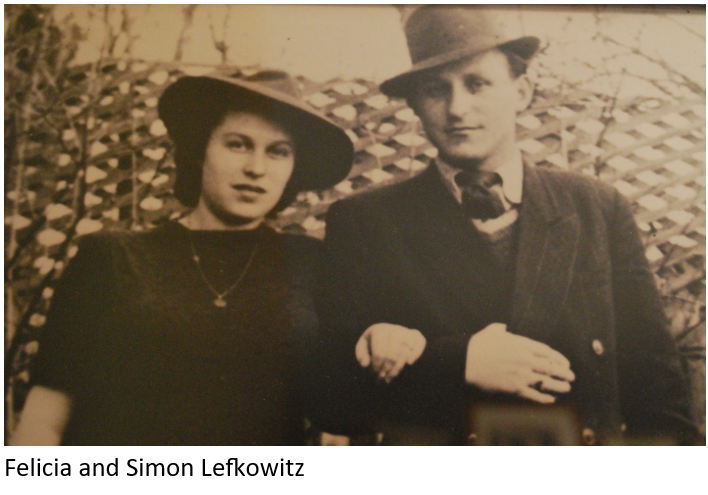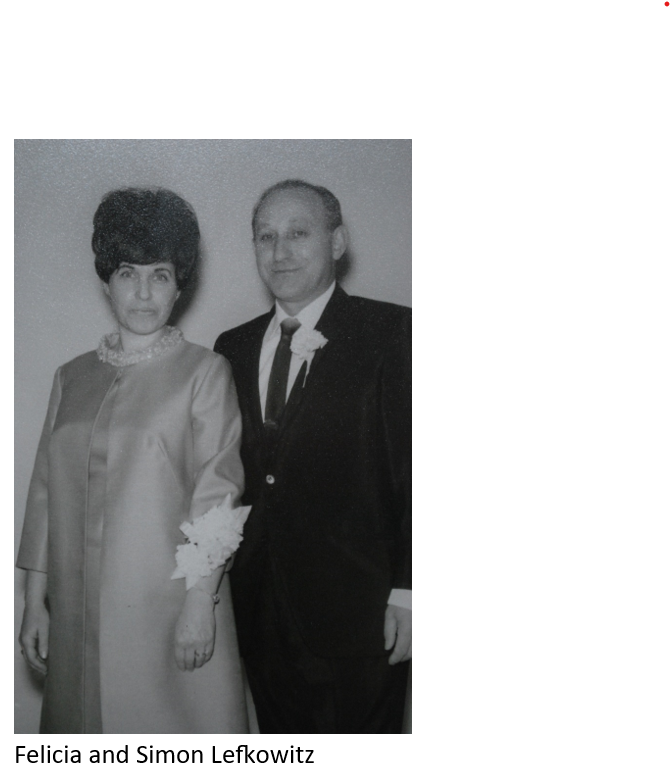Felicia Lefkowitz
"Hold on to being Jewish, be a Jew. Don't forget who you are, don't lose it."
Name at birth
Felicia (Fayga) Goldwasser
Date of birth
06/30/1926
Where did you grow up?
Cracow, Poland
Name of father, occupation
Chaim,
Real estate business
Maiden name of mother, occupation
Sara Kinsler,
Homemaker
Immediate family (names, birth order)
Parents, brother Tzvi who was six years older than me and myself, Felicia
How many in entire extended family?
Maybe 100, my parents had a lot of sisters and brothers, my family was big.
Who survived the Holocaust?
My second cousin Chaya Lieberman Greenwald who was with me in the concentration camps, my first cousin Yitzchak Teller who went to Israel, and me.
The war broke out September 1, 1939. The Germans came in and right away started taking Jews to work, to clean the streets, clean the snow, everyone from ages 12 on up. I was 13 years old when the war broke out. Then they made all the Jews wear a white armband with a blue Star of David.
They made us work and started to build a ghetto. We ran away. My father didn’t want to go into the ghetto. We ran away to Gorlitz, a small city; my mother had a cousin there. But there too, the Germans came to our houses. They took out Jews and killed them. They knew who was a Jew by the armband.
My parents sent my brother away. The Germans caught him and sent him to Plaszow which was not yet a concentration camp. He ran away back to the Ghetto where the family was. My parents wanted me to go from Gorlitz back to Cracow to get away. My parents left but were caught and were sent away, I think they were taken to Belzec Death camp.
I took off my armband and went on a train back to Cracow. I stayed a couple of days with a non-Jewish friend of the family. I was in seclusion. Our friend was afraid that someone would recognize me, so he took me back to the Cracow Ghetto. I was split up from my parents.
In the ghetto, I stayed with my aunt and uncle. My brother Tzvi who was older, stayed with his friends. In 1943, we were taken from the Cracow Ghetto to Plaszow concentration camp. I in the Ghetto from 1941 till 1943 until it was liquidated.
My brother Tzvi ran away from the ghetto. He made false Polish papers and ran away, he looked like a Gentile. They caught him later because a Gentile woman reported him. He denied it, they said for him to remove his pants to show his circumcision. He was taken to the Montelupich Jail in Cracow for weeks. They sent him back to Plaszow. I couldn’t believe that he came out of the jail.
Thirty came back from the jail. The Nazis wanted to teach us a lesson, they shot them. Twenty seven were killed, only three survived; my brother Tzvi was one of the three. But he was very sick, he had been beaten, and his body had pus all over it. He got better and went to work, we would see each other.
Then they sent me to Skarzysko. One Gentile who was with him in the camp brought me a letter from him.
In the ghetto, I sewed for the German military, putting on buttons, 6-7 hours a day. I was too young. There was constantly an Appel, a roll call. They would send people out, we used to hide.
In Plaszow, I worked doing sewing and then later in the paper gemeinschaft or paperworks. Plaszow was built on the Jewish cemetery. They made us knock down the head stones and from the headstones they built streets. There were a lot of hills there. Who didn’t work so well, they killed on the spot. The SS came out with big dogs, they would jump on you, bite you, sometimes kill you; it was terrible.
They would give us some soup after twelve hours of work, soup made of potato peelings. They gave us a piece of bread, maybe an eighth of a loaf of bread a day. In the morning, they gave us coffee to drink, not really coffee. And if you saved yesterday’s piece of bread, you would eat that. You would eat the soup and tried to save some bread for the morning.
Then at Skarzysko, I worked in an ammunition factory, for 12 hours with the same kind of food. They would hit you, scream at you. On the night shift you worked 12 hours, on the day shift you worked 12 hours. I learned to use the machines there. I put shell casings on bullets. Poles would check our work, they were free. If there was a nice Pole, he would give us some extra piece of bread.
The Russians were coming, we were evacuated in 1944. I ran away, my second cousin and me were hiding. My group went to Czestochowa, we were afraid they were going to kill them. They took us to Leipzig ammunition factory in Germany. They took our clothes, we were told to take everything off. We were stripped, deloused, and given uniforms with stripes to wear.
We heard that at Auschwitz they were using poison gas. We came to Leipzig in the middle of the night. We didn’t know whether they were going to use water or gas in the shower. We saw the water come out and were happy about that.
We worked every day, different shifts, they gave us more bread, a half a loaf of bread a day, some margarine, this was in Germany. We worked for the Hassak ammunition factory, same name as in Skarzysko. I didn’t use the same machines, before we put cases on bullets.
The Poles lived in private homes; they were our supervisors like the Germans.
We talked, at 10 PM, it was lights out, and then we went to work in the ammunitions factory. We worked twelve hours a day. We woke up at 6 AM, it was dark out. Once a month, we were deloused, we took showers. Jews were on one side, Poles on the other. There were about 500 people in one big barracks. Everyone had a number on their dress at Leipzig.
In, April, 1945 they took us outside. On one side, the Russians were coming, on the other side, the Americans and the British were coming. We walked for two weeks. We had no food. If someone wanted water, they shot him. We had no food. We had to keep going day and night. I was so weak I fainted, my cousin said wake up. My cousin said; see how the Russians are bombing.
They put us in a barn for cows, that’s where we stayed. We lay on the hay. Gestapo women were with us, there were 25 in our shack.
The Gestapo went away. We sat and waited, when we saw that they were gone, that no one was watching us we realized we were free.
We went to the field where there were potatoes in the ground. We started to eat the potatoes raw, later we baked them. Civilian Germans were afraid to see us, they were afraid that we were going to kill them. They asked us what do you want, they gave us food
The Russians came and said we free. They took care of us. Russian soldiers wanted to sleep with the girls, we barricaded ourselves, and ran away to the city. There we found civilians who helped us. My group of 10 girls stayed all together. We wanted to go back to Poland. After a month I finally came back home to Cracow.
My cousin found her father, he was freed before us. My girlfriend’s father knew that my brother had died.
When we came home, every one was registered. I hoped to find my family. I worked as a waitress in a kosher restaurant in Cracow. Through friends there, I met the man who was to be my husband.
My husband, Shimon Lefkowitz, was born in Oswiecim where Auschwitz was located. He survived ten concentration camps.
Name of Ghetto(s)
Name of Concentration / Labor Camp(s)
Where did you go after being liberated?
I lived in Munich and was married in Stuttgart, Germany
When did you come to the United States?
1949
Where did you settle?
Detroit, Michigan
How is it that you came to Michigan?
The Joint Distribution Committee (JDC) gave us papers.
Occupation after the war
We had nothing in the beginning, it was very hard. We didn’t speak English, my husband got a job in the auto factory but we were Shomer Shabbos (we observed the Sabbath). He wanted a job where he wouldn’t get fired for any reason. My husband learned a trade becoming a painter. My husband didn’t let me work. He said to me, “You take care of Chanala,” our little daughter.
When and where were you married?
July 1946 in Stuttgart, Germany. I was 20 years old; my husband was nine years older. In 1949, we registered to go to Israel or to the United States. The papers for the United States came though first so we came to America. We registered with the Joint (Joint Distribution Committee) in July, 1949, we were here in November.
Spouse
Simon,
Painter
Children
Three: Chana, bookkeeper; Chaya, homemaker; Harvey, podiatrist
Grandchildren
Thirteen: Vicki, Moishe, Itzy, Shifra, Frimet, Chaim, Suri, Yudi, Tzimmi, Blimi, Helene, Rhonda, Stephen; Great Grandchildren: Nineteen (so far)
What do you think helped you to survive?
I don’t know, I think Hashem (G-d) wanted me to bring a Jewish family into the world, we all stayed Orthodox.
What message would you like to leave for future generations?
Hold on to being Jewish, be a Jew. Don't forget who you are, don't lose it.
Interviewer:
Charles Silow
Interview date:
02/16/2011


